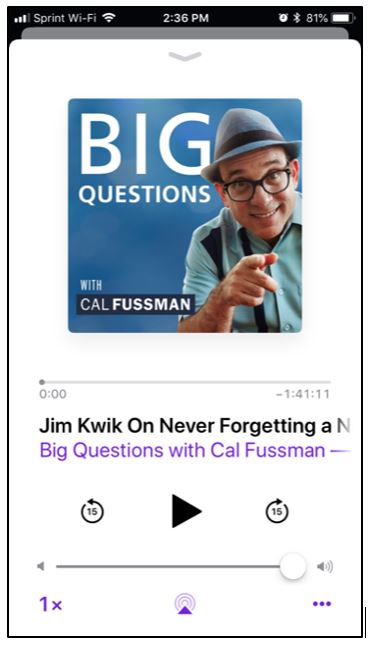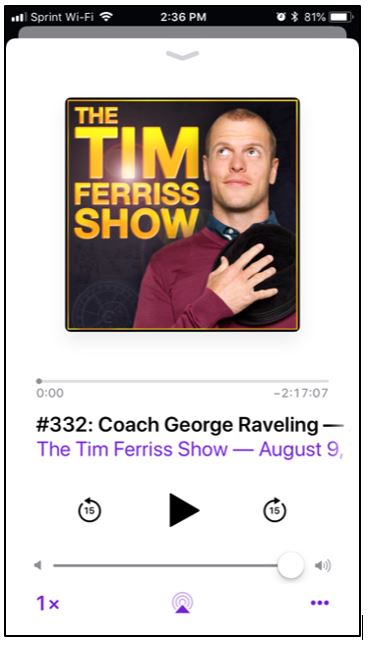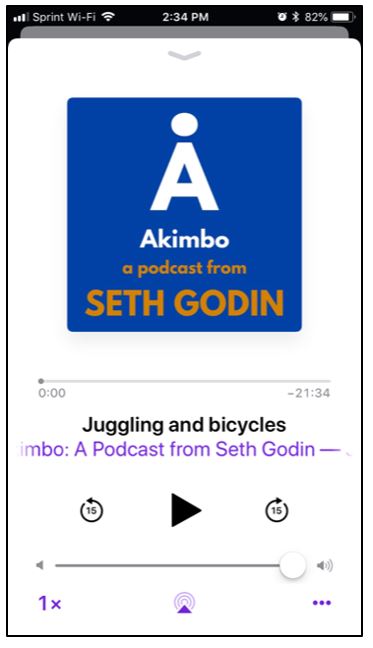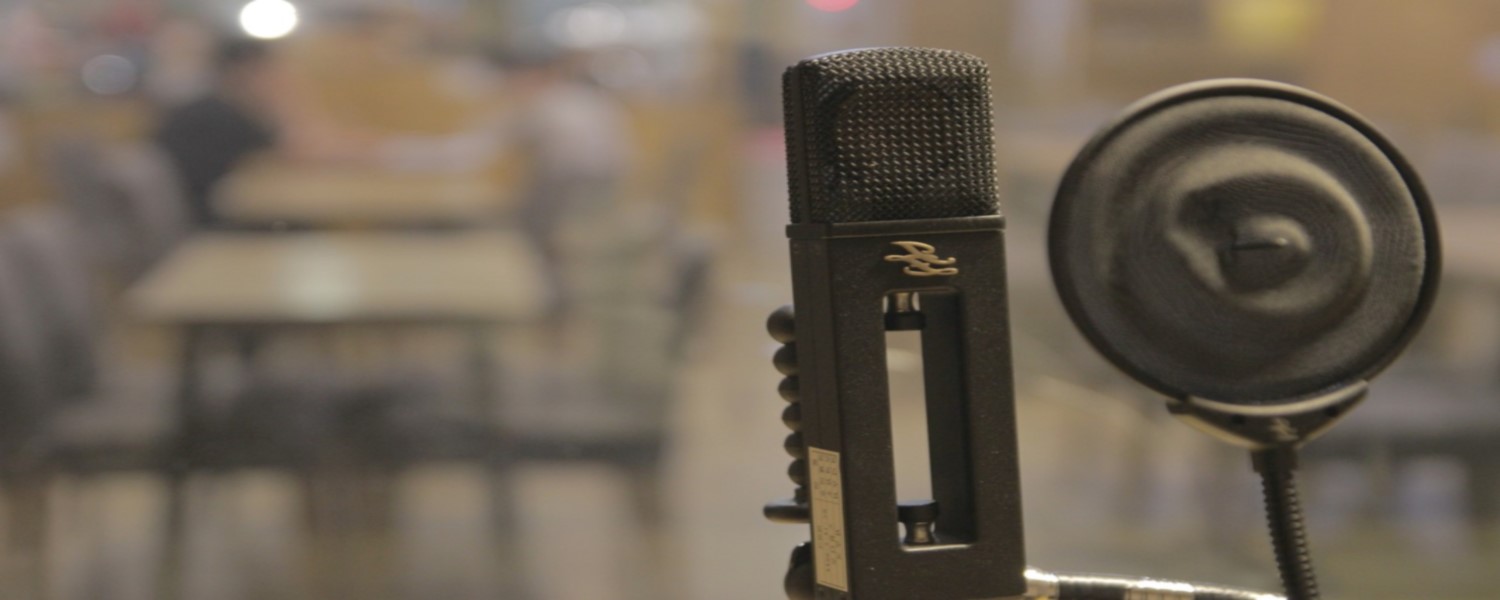3 of the Best Podcast Episodes I Have Ever Heard!
How do you learn best?
We all have a favorite way of learning – some of us learn best by reading, some of us learn best by watching, some of us learn best by doing, and some of us learn best by listening.
As for me, I learn best by reading, by doing, and now…by listening.
Luckily for me, my good friend Bri got me into podcasts a couple years ago which has really transformed my ability to learn by listening. It’s a great way to learn while I am walking, driving, or hanging out by the pool in my banana hammock (remember, I am originally from Canada).
Anyhoo, seeing as how sharing is caring, in today’s blog post I am going to introduce you to 3 of the best podcast episodes I have heard and briefly dig into one of my favorite episodes from each to share some of the lessons I learned.
So, without further ado, here we go!
(1) Cal Fussman’s Big Questions
Episode #20: Guest – Jim Kwik
1 hour, 41 minutes and 11 seconds | Click to listen to the episode online

Cal Fussman is an American journalist and author. He is also a master interviewer who has interviewed everyone from Gorbachev to Ali. Cal has an incredible ability to ask phenomenal questions. This helps connect the dots to help convey and clarify the interviewee’s message. Hence the name of the podcast, ‘Big Questions’.
In this episode, he interviews a man named Jim Kwik. Kwik is a man who had an unfortunate accident when he was a young man when he fell and hit his head on a radiator while in elementary school. After being taken to a hospital and treated he found that he had a hard time reading and remembering things from that point through high school. I mention his backstory due to the fact that it only makes his becoming the world’s most foremost memory coach that much more impressive.
Lessons learned – Use It or Lose It:
While the whole episode is fascinating, I will focus solely on his advice for a topic that many of us struggle with, which is…how to remember people’s names.
As we all know, forgetting someone’s name can be the cause of much embarrassment and pain, while remembering names can be a source of victory.
To remember names, Kwik teaches a method using the acronym ‘MOM’. The M stands for motivation, the O stands for observation, and the M stands for mechanics. Let’s take a quick look at each:
Motivation
Starting with motivation, he suggests that even if you have a hard time remembering names, you would be able to remember the name of the next stranger you meet if he offered you a suitcase with a million dollars in it!
It’s true, right? And think about it – there was no special technique used, you were just motivated and had a reason to remember it.
That’s the key according to Kwik – you need to ask yourself ‘why’ you want to remember the name.
Is it to show them respect?
To make a new friend?
To get a new client?
So, come up with a reason to remember a person’s name when you meet them, and you will remember it. You may also want to reverse engineer it by thinking back to names you have remembered in the past to see ‘why’ you remembered them.
Observation
The second part of MOM is observation.
Kwik summarizes it by saying ‘it’s not your retention, it’s your attention’. The art of memory is the art of attention.
He then tells a story about having dinner with former President Clinton and a bunch of other celebrities. Amazingly, Clinton remembered his name and recalled a previous conversation they had.
Clinton then told Kwik a story about how his grandfather would tell stories to him and the other grandkids when they were children. Then, when he was finished he would quiz the grandkids to see if they were paying attention – that’s where he thinks his ability to be present originated.
According to Kwik, when Clinton was telling Jim the story, he was focused completely on him, which he found amazing. It is well documented that this is the essence of Clinton – he has a powerful presence with people. That is also the secret to his incredible memory, his incredible memory and his powerful presence with people comes from being powerfully present with people.
Kwik concludes the segment on observation by asking a question: ‘who else could do what Clinton does?’
The answer is…all of us – all we need to do is be present and just listen, there are no special skills involved!
Mechanics
The last part of MOM is mechanics.
Mechanics are simply the strategies or skills that you can use to learn another language, memorize a speech or a phone number. For example, a technique FDR used was to picture the person’s name on their forehead in a certain color to remember their name.
Kwik didn’t get too deep into mechanics. However, I will be doing an upcoming blog post on them, and there is no doubt I will be referencing some of Jim’s amazing work!
There was a reason he didn’t get too deep into mechanics. While they are important, he believes that 80% of success is psychology, motivation, and observation. So, just being motivated to remember someone and really observe them will help us remember them and not just their name.
(2) The Tim Ferriss Show
Episode #332: Guest – George Raveling
2 hours, 17 minutes and 7 seconds | Click to listen to the episode online

One of my favorite podcasts is the Tim Ferriss Show. Tim interviews and deconstructs world-class performers of all types. His mission is to tease out the lessons, habits, and routines from each so that his listeners can use them in their own lives.
I have listened to many of his episodes and I’ve learned something from every single one. So, coming up with a favorite episode was tough. However, I am going to go with a recent one, Episode #332 with a man by the name of George Raveling.
Mr. Raveling is an 80-year-old living legend and Nike’s former Director of International Basketball who was the 1st African American head basketball coach in the Pac8/Pac12.
Known as ‘the human Google’ due to his penchant for reading and learning, he was the head basketball coach at Washington State, the University of Iowa and the University of Southern California. Raveling is a member of both the Naismith Pro Basketball Hall of Fame, as well as the College Basketball Hall of Fame.
Lessons learned – Use It or Lose It:
There were so many amazing lessons learned from this podcast, but I will limit it to just two themes. When Tim asked Mr. Raveling if he collected anything (other than black history memorabilia – for which he has a huge collection) – he responded ‘friends and books’. And as you will see he shared many pearls of wisdom on both topics:
In terms of friendships…
Raveling looks at relationships as a privilege, with the most important components being trust and respect – both of which must be earned. He also has a theory relating to friendships which is that If you help enough people get what they want, you will get what you want.
When meeting someone and becoming friends with them, Mr. Raveling asks himself the following two questions at the outset:
What do we have in common?
What can I help them with and what can I do for them?
He concluded the segment on friendship by stating that he tries to only surround himself with people who want to see him improve and help him improve as well as those whose lives he can contribute to.
Regarding reading and books…
Being a big book nerd myself, I found it extremely inspiring that even at 80 years of age, Mr. Raveling is still a voracious reader and extremely focused on learning and improving himself every day.
In fact, he has 2,500 books at his home and another 600-700 in storage – he said that doesn’t go anywhere without a book and notebook.
He has a particularly interesting way of reading books. Instead of reading books front from to back, he instead goes to the index, finds what he thinks is an interesting chapter and goes from there. This is because he thinks each book has maybe 8 to 10 quality chapters, He then divides books into messages and takes copious notes in the margins and on the blank pages within the book to help him remember the salient points.
I also thought he had a cool routine for buying books. First, he looks at the books on sale to see if anything catches his eye, then he goes to the non-fiction new releases. When a book catches his eye, he picks it up and reads about the author, and skims the promos down the side. Then he will pick a chapter and start reading to learn the writer’s style.
If he thinks the book will make him think or change how he thinks, acts or behaves, it fulfills his criteria and he buys it.
Finally, he found he was spending too much time reading papers and blogs, so he started segmenting his reading. I think he may have read a previous blog post of mine on Prime Your Pump because now he batches his reading – one day he reads blogs/magazines/papers, the next he reads books.
Interesting footnote:
A young Raveling visited the March on Washington in 1963, and seeing as how he was so tall, he was asked to volunteer as a security guard. As part of his job, he ended up being up on stage with all the speakers.
To make a long story short, Martin Luther King was the last speaker, and when he was finished Raveling asked if he could have the piece of paper with his speech on it. All these years later, he now owns an important part of history (although he keeps it locked up in a vault in L.A. due to security reasons).
Another interesting fact from that day, the “I have a dream’ part of King’s speech was not planned and was not in his notes. Interestingly, he ad-libbed it in after Mahalia Jackson, a famous gospel singer who was seated behind him and had heard him speak before, encouraged him to ‘tell them about the dream Martin, tell them about the dream!’
(3) Akimbo – a podcast from Seth Godin
Episode: Juggling and Bicycles
21 min and 34 seconds | Click to listen to the episode online

The last podcast episode I am going to cover is one by marketing guru extraordinaire and author Seth Godin. In this episode, Godin discusses the importance of eliminating status, shame, and fear when learning to do something.
Lessons Learned – Use It or Lose It:
The first example he gives is in learning how to ride a bike and how using training wheels do not help you ride a bike better, they just teach you how to pedal – which is the easiest part. The reason people using training wheels is:
(1) to give status that you can ride a bike,
(2) to reduce the shame from falling and
(3) to eliminate the fear of falling
But the thing is, they do not help you ride a bike better!
That is because riding a bike is all about balance, something training wheels do not help with. A better way to learn is to use a Strider bike, which is a bike without pedals, which doesn’t teach the kid how to ride a bike but teaches them how to balance. Therefore, you have taught them how to ride a bike without learning how to ride a bike because you haven’t used status as a threat, shame or had to deal with fear.
His second example is about juggling, and his example is similar. People think juggling is about catching. They will do almost anything not to drop a ball because dropping a ball costs them status, they will lunge for each ball just to catch it. And people who watch jugglers watch how many times the juggler drops the ball because jugglers aren’t supposed to drop the ball. So, the focus of learning how to juggle and watching the juggler is all about not making mistakes. Instead of learning how to juggle properly, the focus is on status (of being able to juggle), shame (of dropping a ball) and fear (of dropping a ball).
And that is the problem, juggling is not about catching it’s about throwing!
So, he goes on to teach you how to juggle by focusing on perfecting the throws instead of worrying about the catches.
His last example is about playing tennis and how unless you are a pro or playing in a club championship keeping score and serving (which most people suck at) is pointless because it keeps you from improving your game and you are just doing it for status.
The message is that to learn or improve at anything we need to let the status, shame, and fear go.
Instead, focus on the building blocks of improvement. They are different than the parts that we think are important when we are watching from the outside.
Well, that’s it for today. Time to throw on my banana hammock and go chill by the pool and listen to a podcast.
Until next time, keep listening to those podcasts and as always…PYMFP!
–Rick
What Do You Think? – Best Podcast Episodes
Do you listen to podcasts? What are some of your favorites? I’m always looking for new ones to listen to! Please share in the comments below.
If you enjoyed this post, it would mean the world to us if you shared it with people you care about via any of the social media platforms below!
Popular Previous Posts:
How to Be Successful By Learning From Others
Meeting Etiquette: This is How to ‘Meet’ Expectations
How to Get Up Early and Refuse the Snooze!
Conversation Skills: This is How to Hack Your Yak!
This is How to Have an Eye for Eye Contact Communication


Let me be completely honest – I have never listened to a pod cast. But that does not mean that your posting today becomes totally devoid of interesting tidbits worth commenting on.
Remembering names…..a common problem for darn near everyone. I try to associate the name with some characteristics – Steve (the guy who wore that ridiculous polka dot shirt), or Susan (the gal from St Louis who’s interested in Wedgwood china). It helps that at large gatherings, people wear name tags. I even designed my own that I take with me to conventions, it’s better than just a label stuck to your shirt, plus the personalized name tag might be the characteristic that helps someone remember me.
George Raveling…..he is to college basketball what John Madden is to football, and Casey Stengel or Tom Lasorda was to baseball. A fountain of knowledge extending back decades, not only of the sport itself, but also relating the lessons learned on the field or court to one’s regular life. George let everyone at USC (especially the players) know that he was in charge, and if you don’t like it, then leave. Three highly recruited players opted to depart, and George never looked back. And as far as him snagging the written copy of King’s speech – he saw the opportunity and seized the moment. More power to him – the right place at the right time. You can’t plan that, it just happens.
Bicycles and juggling……there’s an interesting combination. Many years ago, I swore that I would never ride a two wheeled vehicle again, after a friend hit a dog on the freeway while riding his motorcycle. His helmet saved his life. To this day, his left shoulder has not regained full functionality. So no bicycles, motorcycles, hoverboards roller blades, scooters, or anything else with two wheels.
Now juggling – my daughter taught herself how to juggle when a teenager, using bean bags (they don’t roll away when dropped). You say “focus on the throw, not the catch”. Amy figured out that she needed to start the throw when the previous bean bag arrived at the top of its trajectory. So that’s the point in space where your eyes have to focus, not on your hands. And no, she never tried chain saws.
Now we are at the very end. So then you donned your banana hammock and went outside to the pool? Does that mean you write these columns while being naked? Or maybe pantsless?
Dave – Those are definitely some great ways to remember names – associating people with things or images is a great way to remember names. Raveling is amazing, truth be told I didn’t know a lot about him before listening to the podcast – it is definitely worth a listen online if you have time/interest – the link is embedded in the post. I’m the same with bikes and motorcycle, especially the way people drive here in Miami! I learned to juggle the same way as Amy did with beanbags and top of the trajectory method – I wonder if I would have learned faster using Godin’s method. As for my attire for writing these columns…a good blogger never gives away his secrets! Have a great day! Rick